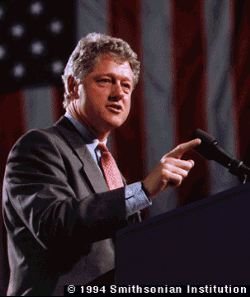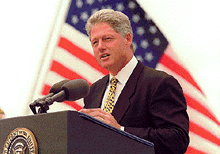|
||||||||||||
|
In His Own Words
A look at President Clinton's statements and records on a variety of issues |
|||||||||||
Abortion
President Clinton supports the right of a woman to choose to have an abortion. During
his Presidency, he overturned the so-called "gag rule" which prohibited federally-
funded clinics from giving women advice about abortion, supported Medicaid funding
of abortions for poor women, and signed the Freedom of Access to Clinic Entrances
Act, which tries to prevent blockades of abortion clinics.
Affirmative Action
Last year, President Clinton ordered a review of the government's affirmative action
programs which concluded that affirmative action was still effective and necessary,
despite the need for some reforms. He has expressed his strong opposition to the
California Civil Rights Initiative and other efforts to "turn back the clock" on
affirmative action.
Balanced Budget
President Clinton has tried to stake out a moderate position on balancing the budget.
He proudly takes credit for submitting the first balanced budget in 17 years, and for
winning passage of the largest deficit reduction package in history. But while he
promises to balance the budget by 2002, he is opposed to a constitutional amendment to
mandate a balanced budget.
Community Service
President Clinton counts the creation of the AmeriCorps program, which gives young
people college scholarships in exchange for national service, as one of the most
significant achievements of his first term in office.
Crime
President Clinton's first term has been marked by several major crime initiatives,
including a ban on assault weapons, the Brady Bill which requires a waiting period for
people purchasing handguns, and a plan to hire 100,000 new police officers. The
Clinton campaign points to decreasing crime rates as evidence of the Administration's
success.
Education
President Clinton's first term has seen him come out in support of school uniforms,
sign the Goals 2000 bill which encourages states to develop standards for public
education, and expand the Head Start program. While he supports giving parents a
choice of public schools for their child's education, he opposes proposals to provide
vouchers for private or parochial school education. He has strongly opposed plans to
eliminate the Department of Education, which he considers essential.
The Environment
Although some environmentalists have criticized him for not going far enough on some
issues, President Clinton's record shows that he signed legislation strengthening the
Foreign Relations
During President Clinton's administration, the United States has sent troops to Somalia,
where the mission was widely regarded as a failure, and Haiti and Bosnia, which have
been successes. The President helped facilitate the peace treaties between Israel and the
Palestinians and Israel and Jordan. He has also been a strong supporter of free trade,
winning passage of GATT and NAFTA.
Health Care
There is probably no issue more connected with President Clinton's first term than
health care. In the first two years of his Presidency, President Clinton proposed a
sweeping health-care reform proposal which ultimately failed. He has, however,
succeeded in getting several smaller legislative initiatives passed, including the Family
and Medical Leave Act, the Kennedy-Kassenbaum Act which guarantees coverage to
people with pre-existing conditions and people who change jobs, and a Childhood
Immunization Initiative. He has also promised to continue to protect Medicare against
proposed cuts, as he did in his first term.
Immigration
President Clinton's approach to immigration policy has been twofold. He has worked
to limit illegal immigration by deploying a record number of Border Patrol agents and
increasing sanctions for employers who hire illegal immigrants. On the legal
immigration side, he has presented a plan which calls for fewer total immigrants, but
which still allows for family reunification. The Administration's "Citizenship USA"
program helped deal with a record number of applications for citizenship, in part
through an increase in the Immigration and Naturalization Service's staff.
The Internet
Student Loan Programs
President Clinton has established several programs aimed at expanding students access
to money for college. In addition to the AmeriCorps community service program (see
"Community Service," above), his Direct Lending Program allows students to repay
their loans on flexible terms, including pay-as-you-earn. During the campaign, the
President has proposed a new HOPE scholarship, designed to pay the cost of the first
two years of a community college education, a $10,000 per year tax deduction for the
cost of college tuition, and a new merit-based scholarship program to provide the top
five percent of high school graduates with $1,000 towards the cost of college.
|
Clinton/Gore '96
A PARODY of the Clinton for President Web Site
The Moment takes a look at Dole's positions as well
The Moment reports on the Changing Tides of Politics in America
|
||||||||||
| © Copyright 1996 Columbia University |
|||||||||||


